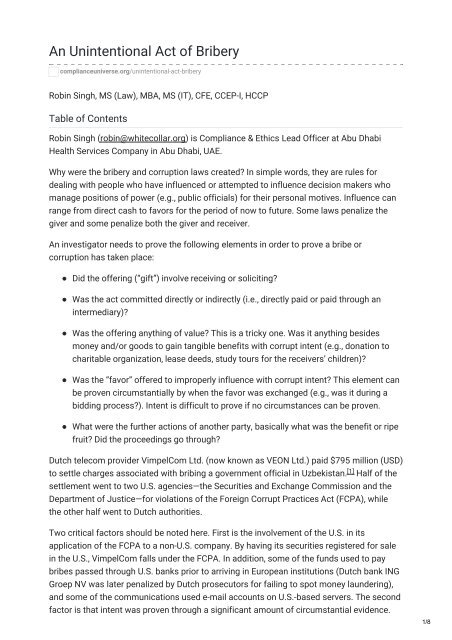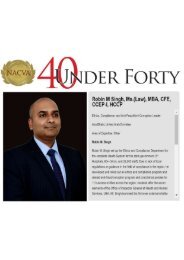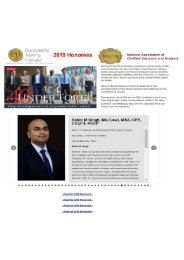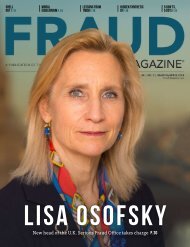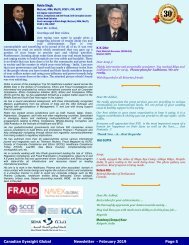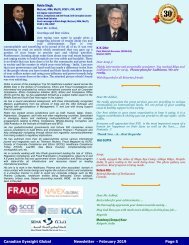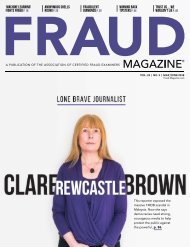complianceuniverse.org-An Unintentional Act of Bribery
Create successful ePaper yourself
Turn your PDF publications into a flip-book with our unique Google optimized e-Paper software.
<strong>An</strong> <strong>Unintentional</strong> <strong>Act</strong> <strong>of</strong> <strong>Bribery</strong><br />
<strong>complianceuniverse</strong>.<strong>org</strong>/unintentional-act-bribery<br />
Robin Singh, MS (Law), MBA, MS (IT), CFE, CCEP-I, HCCP<br />
Table <strong>of</strong> Contents<br />
Robin Singh (robin@whitecollar.<strong>org</strong>) is Compliance & Ethics Lead Officer at Abu Dhabi<br />
Health Services Company in Abu Dhabi, UAE.<br />
Why were the bribery and corruption laws created? In simple words, they are rules for<br />
dealing with people who have influenced or attempted to influence decision makers who<br />
manage positions <strong>of</strong> power (e.g., public <strong>of</strong>ficials) for their personal motives. Influence can<br />
range from direct cash to favors for the period <strong>of</strong> now to future. Some laws penalize the<br />
giver and some penalize both the giver and receiver.<br />
<strong>An</strong> investigator needs to prove the following elements in order to prove a bribe or<br />
corruption has taken place:<br />
Did the <strong>of</strong>fering (“gift”) involve receiving or soliciting?<br />
Was the act committed directly or indirectly (i.e., directly paid or paid through an<br />
intermediary)?<br />
Was the <strong>of</strong>fering anything <strong>of</strong> value? This is a tricky one. Was it anything besides<br />
money and/or goods to gain tangible benefits with corrupt intent (e.g., donation to<br />
charitable <strong>org</strong>anization, lease deeds, study tours for the receivers’ children)?<br />
Was the “favor” <strong>of</strong>fered to improperly influence with corrupt intent? This element can<br />
be proven circumstantially by when the favor was exchanged (e.g., was it during a<br />
bidding process?). Intent is difficult to prove if no circumstances can be proven.<br />
What were the further actions <strong>of</strong> another party, basically what was the benefit or ripe<br />
fruit? Did the proceedings go through?<br />
Dutch telecom provider VimpelCom Ltd. (now known as VEON Ltd.) paid $795 million (USD)<br />
to settle charges associated with bribing a government <strong>of</strong>ficial in Uzbekistan. Half <strong>of</strong> the<br />
settlement went to two U.S. agencies—the Securities and Exchange Commission and the<br />
Department <strong>of</strong> Justice—for violations <strong>of</strong> the Foreign Corrupt Practices <strong>Act</strong> (FCPA), while<br />
the other half went to Dutch authorities.<br />
[1]<br />
Two critical factors should be noted here. First is the involvement <strong>of</strong> the U.S. in its<br />
application <strong>of</strong> the FCPA to a non-U.S. company. By having its securities registered for sale<br />
in the U.S., VimpelCom falls under the FCPA. In addition, some <strong>of</strong> the funds used to pay<br />
bribes passed through U.S. banks prior to arriving in European institutions (Dutch bank ING<br />
Groep NV was later penalized by Dutch prosecutors for failing to spot money laundering),<br />
and some <strong>of</strong> the communications used e-mail accounts on U.S.-based servers. The second<br />
factor is that intent was proven through a significant amount <strong>of</strong> circumstantial evidence.<br />
1/8
For example, the perpetrator was aware <strong>of</strong> the FCPA but proceeded with the transactions.<br />
Further, the bribed individual was a relative <strong>of</strong> the President <strong>of</strong> Uzbekistan and had<br />
influence over the Uzbek telecommunications regulator. They enjoyed their honeymoon<br />
from 2006 (when VimpelCom was still based in Russia) to 2012.<br />
In another case, California based Sun-Diamond Growers were charged with bribery for<br />
giving gifts to Agriculture Secretary, Mike Espy. In his defense, Secretary Espy said since<br />
he got the gifts from his friend and lobbyist Richard Douglas, he assumed the gifts were<br />
acts <strong>of</strong> personal friendship. He also said he was not even aware that the gifts were paid for<br />
by Sun-Diamond.<br />
The Supreme Court ruled that giving gifts to <strong>of</strong>ficials does not amount to bribery unless<br />
there is an “<strong>of</strong>ficial act” in return for the gifts and overturned conviction in the case.<br />
All factors were in place except for intent. <strong>An</strong> intent is “a state <strong>of</strong> mind while committing the<br />
act.” This requires a lot <strong>of</strong> circumstantial evidence to prove the same. The defense used by<br />
Espy is one <strong>of</strong> the two famous ones; the other one being the “It was all needed, or it was a<br />
normal process, or no deviation was associated with it.”<br />
Although “corrupt intent” while giving or receiving rewards <strong>of</strong> any kind is an important<br />
element to obtain conviction under the FCPA, unintentional acts <strong>of</strong> bribery can also attract<br />
penalties, as in the VimpelCom case.<br />
Even when the receiver or the payee is unaware <strong>of</strong> any actual corrupt activity, he/she is<br />
liable for the corrupt actions <strong>of</strong> any agent.<br />
[2]<br />
Intent: Key element in bribery<br />
Intent is a key element that needs to be established for pro<strong>of</strong> <strong>of</strong> crime under bribery acts.<br />
Generally, corrupt intent, with regard to making or receiving payment in return for a<br />
beneficial act favoring the payee, has to be proven to obtain conviction. Whether the <strong>of</strong>ficial<br />
or individual actually accepted the bribe or became corrupt because <strong>of</strong> it does not matter<br />
as far as conviction is concerned. Also, even if only one <strong>of</strong> the parties involved had corrupt<br />
intentions in mind, it is enough for a conviction.<br />
[3]<br />
The Hobbs <strong>Act</strong> also addresses public corruption and applies to an <strong>of</strong>ficial who obtains<br />
payment while knowing such payment is in return for <strong>of</strong>ficial favors or acts.<br />
A case in point for “honest fraud” is when Bob McDonnell, former Governor <strong>of</strong> Virginia was<br />
convicted in 2014 on bribery charges. He was charged with accepting US$175,000 worth<br />
gifts, loans, and benefits in return for <strong>org</strong>anizing meetings and promotional events for the<br />
payee. The Supreme Court, however, overturned this conviction in 2016, holding that<br />
<strong>org</strong>anizing meetings or events without doing anything else does not amount to an <strong>of</strong>ficial<br />
act for conviction under 18 USC Sections. The Court also stated that for a conviction, the<br />
corrupt act must be a formal exercise <strong>of</strong> power by the <strong>of</strong>ficial.<br />
[4]<br />
Legal and ethical actions for unintentional bribery<br />
2/8
What happens when there are instances <strong>of</strong> unintentional bribery where an individual or an<br />
<strong>org</strong>anization is unaware <strong>of</strong> the serious consequences?<br />
Legal actions<br />
<strong>Bribery</strong> is a punishable <strong>of</strong>fence under FCPA, a federal law in the United States formed to<br />
ensure transparency under the Securities Exchange <strong>Act</strong> <strong>of</strong> 1934 and covers “bribery <strong>of</strong><br />
foreign <strong>of</strong>ficials.” When an act <strong>of</strong> misconduct has occurred, an individual must disclose the<br />
details voluntarily as soon as they become aware <strong>of</strong> the misconduct.<br />
On November 29, 2017, Rod Rosenstein, then Deputy Attorney General, announced the<br />
FCPA Corporate Enforcement Policy, formalizing the “pilot program” <strong>of</strong> 2016. Companies<br />
or individuals who voluntarily disclose violations <strong>of</strong> FCPA and fully cooperate with<br />
investigations, apart from initiating appropriate and timely remedial measures, will not be<br />
prosecuted by the Department <strong>of</strong> Justice (DOJ). The policy encourages voluntary selfdisclosure<br />
<strong>of</strong> misconduct to the appropriate enforcement authorities:<br />
A company or individual who has voluntarily disclosed misconduct can get up to a<br />
50% reduction in penalties in case <strong>of</strong> a criminal resolution. When a company does not<br />
voluntarily disclose but fully cooperates with the investigation later, it can benefit<br />
from a 25% reduction in fine. To become eligible for these credits: The disclosure<br />
should occur before an imminent government investigation or a threat <strong>of</strong> disclosure.<br />
The disclosure should be made promptly as soon as the violation is discovered or<br />
the company or individual becomes aware <strong>of</strong> the same.<br />
Disclosure is made <strong>of</strong> all facts and individuals involved in the violation.<br />
A case in point is when New York-based apparel company Ralph Lauren Corporation<br />
voluntarily disclosed misconduct within two weeks <strong>of</strong> the company discovering illegal<br />
payments that were made to government <strong>of</strong>ficials in Argentina. By doing so, the company<br />
avoided prosecution.<br />
[6]<br />
[5]<br />
Ethical actions (an honest mistake)<br />
The risks <strong>of</strong> being penalized are high even when a payment or gift is received or <strong>of</strong>fered<br />
without any corrupt intent. It can be difficult to prove lack <strong>of</strong> intent, and as already said<br />
above, the principal is liable for an agent's actions. Ideally, it is important to avoid<br />
involvement with any such corrupt situation. If unwittingly part <strong>of</strong> such misconduct,<br />
withdrawing from it as soon as an individual or company becomes aware <strong>of</strong> the nature <strong>of</strong><br />
conduct is crucial.<br />
If a person can jump though all the aforementioned hoops (i.e., the elements required to be<br />
proven for bribery) in order to be proven guilty by the investigator before the case is handed<br />
over to a local prosecutor, then it clearly shows that there was enough deviance in the mind<br />
<strong>of</strong> the “innocent” person to have intentionally committed the act, even after knowing all the<br />
odds.<br />
<strong>An</strong> honest mistake is a proverb and is no excuse in the legal world. If the prosecutor is<br />
unable to prove the direct evidence <strong>of</strong> an intent, then negligence or gross misconduct,<br />
3/8
which is also actions behind the words <strong>of</strong> “an honest mistake,” is also an action which can<br />
be used by prosecutors.<br />
Ethics is knowing not only what the compliance policies say, but also the journey between<br />
one check post to another. <strong>An</strong>d when you deal with a senior role or a government <strong>of</strong>ficial or<br />
an agent, trust me, there are multiple check posts.<br />
A test <strong>of</strong> “reasonability” sometimes helps to sway one’s deviant intentions to good ones.<br />
Always ask: “Would a nice, reasonable person in my place do this?” You would always<br />
know from within if you have good principles in your life.<br />
<strong>An</strong>ti-bribery and self-disclosure in USA, UK, and UAE<br />
Although the critical factors needed to prove bribery remain the same, there are elements<br />
that either reduce the burden <strong>of</strong> a prosecutor or increase it, depending on the type <strong>of</strong><br />
jurisdiction a lawyer/prosecutor is operating within in. Following are the anti-bribery and<br />
corruptions laws focusing on selected jurisdictions.<br />
USA<br />
In the U.S., Section 201(b)(1) <strong>of</strong> the FCPA deals with pro<strong>of</strong> <strong>of</strong> a transaction involving<br />
something <strong>of</strong> value that must be provided by the government to secure conviction <strong>of</strong> the<br />
briber. Similarly, there should be pro<strong>of</strong> that a public <strong>of</strong>ficial received, agreed to, or solicited<br />
something <strong>of</strong> value in exchange for being influenced in his performance <strong>of</strong> <strong>of</strong>ficial duties. A<br />
gratuities conviction requires a knowing or willful <strong>of</strong>fer or receipt <strong>of</strong> something <strong>of</strong> value.<br />
Along with "intent," it has to be proven that the act <strong>of</strong> bribery influenced and resulted in an<br />
<strong>of</strong>ficial act.<br />
Under the voluntary disclosure pilot program, a company can earn credits with the<br />
following ethics and compliance measures:<br />
Establishing a culture <strong>of</strong> compliance<br />
Instituting awareness programs among employees about misconduct<br />
Ensuring adequate resources are deployed for compliance<br />
Performing risk assessment on compliance<br />
Auditing to ensure effectiveness <strong>of</strong> compliance<br />
Many times voluntary self-disclosure involves legal matters in other jurisdictions; and in<br />
many U.S. jurisdictions, no recognized mechanism exists for companies for voluntary selfdisclosure.<br />
UK<br />
The <strong>Bribery</strong> <strong>Act</strong> <strong>of</strong> 2010 is a stringent legislation on bribery, similar to FCPA, but has a wider<br />
scope as compared to the U.S. legislation. The <strong>Act</strong> prohibits receiving bribes or passive<br />
bribery. The jail term and penalties are more stringent in the U.K. Voluntary self-disclosure<br />
is termed “self-reporting” in the U.K and is found in these sources:<br />
4/8
Serious Fraud Office’s (SFO) guidance with respect to Corporate Self-Reporting (the<br />
SFO Guidance): According to these, corporate management has to adopt a ”genuinely<br />
proactive approach” while reporting violations, but there is no guarantee that<br />
prosecution can be avoided by self-reporting.<br />
Code <strong>of</strong> Practice laid down by Deferred Prosecution Agreements (DPA) or the DPA<br />
Code: The Deferred Prosecution Agreement (DPA) is an agreement carried out<br />
between a company and a prosecutor with defined terms on compensation, financial<br />
penalty, compliance, cooperation with investigating agencies, and disg<strong>org</strong>ement <strong>of</strong><br />
pr<strong>of</strong>it. While giving “considerable weightage” to proactive approaches, a DPA does<br />
not lay down the actual benefits or credits for self-reporting, unlike the FCPA Pilot<br />
Program.<br />
The very first DPA was <strong>of</strong>fered to Standard Bank by the SFO on Nov. 30 <strong>of</strong> 2015. The Bank<br />
self-reported payment <strong>of</strong> $6 million in 2013 by a sister concern. Voluntary self-disclosure<br />
and a proactive approach were cited as reasons by Lord Justice Leveson to approve the<br />
DPA.<br />
[8]<br />
Brand-Rex, a network cabling entity in Scotland made a voluntary self-disclosure regarding<br />
the benefits received from an incentive scheme in UK. Brand-Rex was required to pay<br />
£212,800 (i.e., the amount <strong>of</strong> pr<strong>of</strong>it accrued from the incentive scheme) and by cooperating<br />
fully with SFO, avoided indictment.<br />
[9]<br />
[7]<br />
Middle East<br />
At both Emirates and at the Federal level, a broad range <strong>of</strong> bribery legislation encompasses<br />
cabinet resolutions and regulations. The primary sources <strong>of</strong> anti-corruption laws are:<br />
The UAE Federal Penal Code - Articles 234-239 <strong>of</strong> Federal Law No.3/1987<br />
Individual Emirates penal codes such as:<br />
Dubai Penal Law (1970) – The Dubai Penal Code<br />
Abu Dhabi Law No.1/1970- Abu Dhabi Penal Code<br />
Dubai Financial Fraud Law (Law on Procedures for the Recovery <strong>of</strong> Illegally Obtained<br />
Public and Private Funds)<br />
The definition <strong>of</strong> bribery is the same in UAE, but absence <strong>of</strong> “corrupt intent” means no<br />
<strong>of</strong>fence has been committed. However, in the Dubai Penal Code, even if there is no corrupt<br />
intention by either the giver or the receiver, the act <strong>of</strong> <strong>of</strong>fering or receiving gifts is a criminal<br />
<strong>of</strong>fence. <strong>An</strong>onymous reporting <strong>of</strong> violations can be done through the reporting website <strong>of</strong><br />
the State Audit Institution (SAI). Although confession <strong>of</strong> bribery can result in exemption<br />
from punishment, no procedures are defined for time frame, manner, or process <strong>of</strong> such<br />
disclosure.<br />
Coming clean with voluntary self-disclosure<br />
Prosecutors and lawyers emphasize voluntary disclosure <strong>of</strong> any corporate or individual<br />
5/8
wrongdoing in good faith and in a timely fashion to maximize credits and to avoid harsh<br />
penalties. Such a disclosure is in the <strong>org</strong>anizations' best interests, because it can help<br />
avoid prosecution, bankruptcy, and loss <strong>of</strong> trust <strong>of</strong> its customers.<br />
What should companies do?<br />
Voluntary self-disclosure is the ideal way to come clean and avoid stringent penalties.<br />
Where failure to report a known act <strong>of</strong> corruption is a criminal <strong>of</strong>fence, but the employees<br />
or the company itself are not implicated, the company can act to comply with the<br />
regulation. Reporting corruption when employees or the <strong>org</strong>anization are implicated in the<br />
said corruption puts the company in a difficult position. By reporting, a company can risk<br />
incriminating its employees or itself, but failure to report is a more serious criminal<br />
<strong>of</strong>fence. The key considerations and benefits <strong>of</strong> reporting misconduct include:<br />
Immunity from prosecution<br />
Mitigation <strong>of</strong> criminal penalty<br />
Mitigation <strong>of</strong> penalties such as debarment or cancellation<br />
Avoidance <strong>of</strong> consequential <strong>of</strong>fences stemming from the fraud, including tax <strong>of</strong>fence<br />
or money laundering<br />
Companies can avoid prosecution and preserve public image by:<br />
Appointing a compliance <strong>of</strong>ficer<br />
Making their employees available for investigations and interviews<br />
Making voluntary disclosures with documents<br />
Conducting risk assessment worldwide<br />
Conducting thorough internal investigations<br />
Making presentations to the DOJ regarding findings <strong>of</strong> internal investigation and<br />
status <strong>of</strong> risk assessment<br />
Conducting extensive training for all employees on FCPA regulations<br />
Strengthening company's anti-bribery policy, Implementing a gift-and-entertainment<br />
policy<br />
Enhancing protocols for due diligence <strong>of</strong> vendors, suppliers, distributors, or other<br />
third-party associates<br />
Terminating third-party agents/vendors or employees after thorough investigation<br />
Instituting a non-retaliation policy for whistleblowers and introducing a hotline<br />
Protecting confidentiality <strong>of</strong> whistleblowers<br />
Hiring a specialized attorney<br />
6/8
What should individuals do?<br />
If there is any unreasonable <strong>of</strong>fer or demand from anyone in return for <strong>of</strong>ficial favors, an<br />
individual can:<br />
Politely refuse to accept or pay a bribe.<br />
If the demand persists, inform the person <strong>of</strong> your company policy regarding bribes<br />
and that you would have to report to your manager or employer, who will then contact<br />
enforcement agencies.<br />
If a government <strong>of</strong>ficial is making the demand for bribe, refer them to particular<br />
government procedures in your jurisdiction. Report the demand to concerned<br />
<strong>of</strong>ficials. Use the company hotline or the government website to report the violation.<br />
If there is no resolution, talk to senior management <strong>of</strong>ficials.<br />
Consult a lawyer, if you are unable to get help from your company.<br />
If possible, document the evidence <strong>of</strong> corruption and maintain all records and eyewitness<br />
statements. Make copies <strong>of</strong> these and hand them over to your<br />
manager/employer or to concerned authorities.<br />
Ask for documentary evidence and pro<strong>of</strong> <strong>of</strong> any payments requested or made.<br />
Conclusion<br />
Although the government has been taking various steps to encourage voluntary selfdisclosure<br />
with enhanced whistleblower incentives, individual accountability remains the<br />
key element when it comes to prevention <strong>of</strong> bribery.<br />
Improved cooperation and increasing focus on investigations around the world amp up the<br />
need for voluntary disclosure in a timely manner. As societies' tolerance for misconduct<br />
steadily decreases, countries including the U.S. Europe, Japan, China, and Australia are<br />
ramping up enforcement capabilities, strengthening anti-corruption regulations, and<br />
focusing on coordinated raids.<br />
1 U.S. Securities and Exchange Commission press release, “VimpelCom to Pay $795<br />
Million in Global Settlement for FCPA Violations” February 18, 2016. http://bit.ly/2UO5FuO<br />
2 United States v. Sun-Diamond Growers <strong>of</strong> California, decided April 27, 1999. 526 US 398<br />
(1999). http://bit.ly/2PAAcZ9<br />
3 Hobbs <strong>Act</strong> (18 USC Section 1951 – Interference with commerce by threats or violence)<br />
http://bit.ly/2Cac0Jr<br />
4 CNN: “Supreme Court vacates former Virginia gov. Bob McDonnell’s conviction.” June 27,<br />
2016. https://cnn.it/2Bkk20H<br />
5 Foreign Corrupt Practices <strong>Act</strong> Corporate Enforcement Policy 2016.<br />
http://1.usa.gov/1MyaeTU<br />
6 Reuters Business News: “Ralph Lauren to pay $1.6 million to resolve Argentine bribery<br />
case” April 22, 2013. https://reut.rs/2RYd4Wr<br />
7 Serious Fraud Office (SFO) Guidance on <strong>Bribery</strong> <strong>Act</strong>. http://bit.ly/2aKo0CD<br />
7/8
8 SFO: SFO agrees to first UK DPA with Standard Bank. November 30, 2015.<br />
http://bit.ly/2MNrp5Y<br />
9 Dan Smith and James Fagan: “The UK’s First Civil Settlement for Failing to Prevent<br />
<strong>Bribery</strong>” October 22, 2015. http://bit.ly/2PBRpBg<br />
Copyright © 2019 Society <strong>of</strong> Corporate Compliance and Ethics. All rights reserved. This<br />
book or parts there<strong>of</strong> may not be reproduced in any form without the express written<br />
permission <strong>of</strong> the publisher.<br />
8/8


